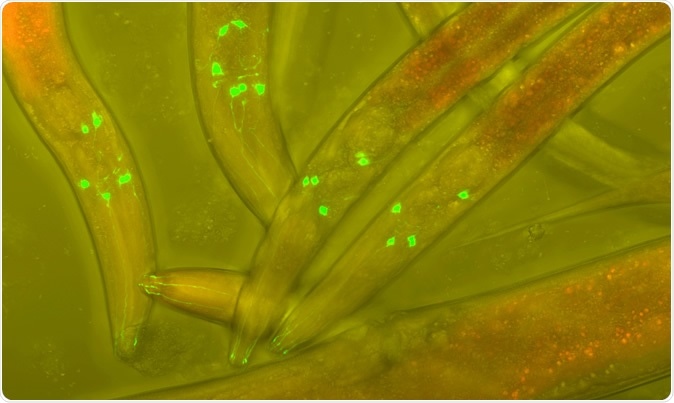One common gut organism that helps us digest food better could also be a powerful instrument in preventing or reversing the symptoms of Parkinson’s disease (PD), according to a recent study. The changes are due to the ability of this bacterium to delay the build-up of a toxic protein involved in this in the disease condition, or even to eliminate the toxin altogether.
The researchers already knew that brain function is linked to the proper working of the gut bacteria. Going on from there, they studied a roundworm model (Caenorhabditis elegans) to see what happened to the toxic protein called alpha-synuclein when the worms are fed a probiotic.

Caenorhabditis elegans, a free-living, transparent nematode (roundworm), about 1 mm in length. Image Credit: Heiti Paves / Shutterstock
Probiotics
A probiotic is a formulation that contains beneficial bacteria, or bacteria that improve the body’s health, either by its direct effect on the gut bacterial population or by the metabolic products derived from it, or by both. The scientists found that this probiotic could actually keep alpha-synuclein from forming toxic clumps which prevent dopamine from building to adequate levels within the brain. Dopamine is an important chemical that helps to achieve smooth muscular movements in the body. This finding could help to uncover through future research how probiotics and other nutritional supplements influence the development and progress of PD.
How alpha-synuclein affects the brain
People with PD show a characteristically misfolded alpha-synuclein in their brains. The result of this abnormal protein folding is not just aesthetic because the way a protein is folded directly impacts its physiological role in the body. The misfolded protein, in this case, forms clumps that lead to the death of the nerve cells that produce the signaling chemical called dopamine. When these cells are no longer present in adequate numbers, the resulting dopamine deficiency causes the onset of PD symptoms, including the tell-tale tremors, freezing in place, an immobile face, quick short shuffling steps, and an abnormal delay in each movement.
The researchers used modified roundworms which contained genes that encode the human form of alpha-synuclein in its abnormal or misfolded version. These genes are inserted from other organisms. The worms were then fed with a variety of probiotics available over the counter. The aim of the researchers was to find out if any of the ‘good’ bacteria in the probiotics was capable of slowing down clump formation.
Using the probiotic
When they used a probiotic containing the bacterium Bacillus subtilis, things started to look brighter. The bacteria could form biofilm in the worm gut, releasing their own metabolic products. The results were impressive – both young and older animals benefited from the use of this probiotic.
For one thing, this organism kept the abnormal clumps from appearing. Not only so, where the clumps had already been formed, it seemed to remove some of them from the cell. This led to a more favorable clinical profile in the worm. For instance, their movements became smoother and easier.
How it happens
When the researchers looked at how this occurred, they saw that the bacteria produced its own chemicals that cleared and prevented alpha-synuclein formation. Their chemicals caused an alteration in the way the cell enzymes actually processed sphingolipids in the nerve cells. The change in the metabolism of these fats transformed the fate of the cells, so to speak. Researcher Maria Doitsidou says, “The results provide an opportunity to investigate how changing the bacteria that make up our gut microbiome affects Parkinson's.”
The researchers also saw that the best time to give the probiotic is in childhood, because this produced the most long-term action. When the worms were fed B. subtilis continuously, hardly any protein clumps formed, in contrast. Both dead and live bacteria, as well as spores, seem equally protective. The supplementation of nitrous oxide (NO) to the diet also had a favorable but short-lived effect. The probiotic is not therefore dependent on the colonization of the gut with B. subtilis but by the metabolites it produces.
Implications
“The next steps are to confirm these results in mice, followed by fast-tracked clinical trials since the probiotic we tested is already commercially available,” say the researchers.
Parkinson’s UK research manager Beckie Port commented: “Parkinson's is the fastest growing neurological condition in the world. Currently there is no treatment that can slow, reverse or protect someone from its progression but by funding projects like this, we're bringing forward the day when there will be.”
While many studies have proved the link between gut microbes and brain development and function, other scientists believe that more research is needed to make use of probiotics to improve gut health, and thus to alleviate PD or even delay its symptoms.
Summing up, Beckie Port says, “The results from this study are exciting as they show a link between bacteria in the gut and the protein at the heart of Parkinson's, alpha synuclein. Studies that identify bacteria that are beneficial in Parkinson's have the potential to not only improve symptoms but could even protect people from developing the condition in the first place.”
Journal reference:
Probiotic Bacillus subtilis protects against a-synuclein aggregation in C. elegans. Marıa Eugenia Goya, Feng Xue, Cristina Sampedro-Torres-Quevedo, et al. Cell Reports30, 367–380.e1–e7, January 14, 2020. https://www.cell.com/cell-reports/pdf/S2211-1247(19)31743-7.pdf